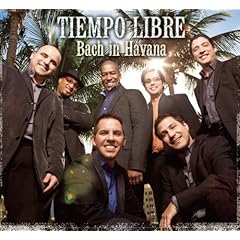Read More about the Tiempo Libre Bustelo promotion here
 Grammy-nominated Tiempo Libre's third major label CD, Bach in Havana fits right in to Cuba's long history of mingling European classical music and Afro-Cuban popular music. The music of J.S. Bach is known for melodic purity and spiritual power. To that, Tiempo Libre has added Cuba's own sacred music (the batá drums and sacred songs of the Yoruba tradition), as well as its rambunctious timba dance rhythms, crafted together with classical reverence and a Latin jazz sensibility. Two of Cuba's finest saxophonists, Paquito D'Rivera and Yosvany Terry, take prominent guest spots.
Grammy-nominated Tiempo Libre's third major label CD, Bach in Havana fits right in to Cuba's long history of mingling European classical music and Afro-Cuban popular music. The music of J.S. Bach is known for melodic purity and spiritual power. To that, Tiempo Libre has added Cuba's own sacred music (the batá drums and sacred songs of the Yoruba tradition), as well as its rambunctious timba dance rhythms, crafted together with classical reverence and a Latin jazz sensibility. Two of Cuba's finest saxophonists, Paquito D'Rivera and Yosvany Terry, take prominent guest spots.This album highlights fine keyboard work by pianist and musical director Jorge Gomez, who says he used to lie in bed at night and listen to his father, a classical pianist, play Bach. All the young members of Tiempo Libre studied classical music at strict, Russian-style conservatories in Cuba, where popular music was taboo. However, they inhaled Afro-Cuban musical traditions, such as rumba, son, danzon, timba and Santería, just by growing up there, where music is in the air, in the streets, in private homes and nightclubs. You might say that Bach in Havana takes classical music from the salons out into the solares, the courtyards in poor, black neighborhoods in Cuba where the rumba was born.
It's interesting to contemplate "Air on a G String" [sic] had it been written as a lovesong to a beautiful behind, if J.S. Bach could walk the streets of Miami Beach, sans powdered wig, waistcoat unbuttoned to mid-chest. Tiempo Libre doesn't only loosen up the classics, it breathes new life into them. This album might help a lot of people better understand Cuba's birthright and invention of a creole musical language. As North Americans, it's our birthright too.




No comments:
Post a Comment